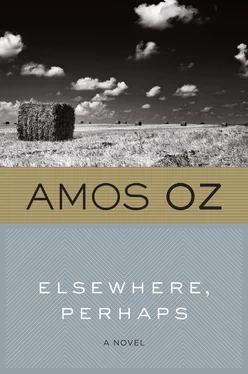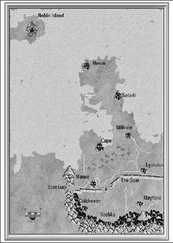Amos Oz - Elsewhere, Perhaps
Здесь есть возможность читать онлайн «Amos Oz - Elsewhere, Perhaps» весь текст электронной книги совершенно бесплатно (целиком полную версию без сокращений). В некоторых случаях можно слушать аудио, скачать через торрент в формате fb2 и присутствует краткое содержание. Год выпуска: 1985, Издательство: Mariner Books, Жанр: Современная проза, на английском языке. Описание произведения, (предисловие) а так же отзывы посетителей доступны на портале библиотеки ЛибКат.
- Название:Elsewhere, Perhaps
- Автор:
- Издательство:Mariner Books
- Жанр:
- Год:1985
- ISBN:нет данных
- Рейтинг книги:4 / 5. Голосов: 1
-
Избранное:Добавить в избранное
- Отзывы:
-
Ваша оценка:
- 80
- 1
- 2
- 3
- 4
- 5
Elsewhere, Perhaps: краткое содержание, описание и аннотация
Предлагаем к чтению аннотацию, описание, краткое содержание или предисловие (зависит от того, что написал сам автор книги «Elsewhere, Perhaps»). Если вы не нашли необходимую информацию о книге — напишите в комментариях, мы постараемся отыскать её.
Elsewhere, Perhaps — читать онлайн бесплатно полную книгу (весь текст) целиком
Ниже представлен текст книги, разбитый по страницам. Система сохранения места последней прочитанной страницы, позволяет с удобством читать онлайн бесплатно книгу «Elsewhere, Perhaps», без необходимости каждый раз заново искать на чём Вы остановились. Поставьте закладку, и сможете в любой момент перейти на страницу, на которой закончили чтение.
Интервал:
Закладка:
"Yes, I'm the guilty party." As Zechariah spoke, he scratched his eyebrows and his little mustache with his thumb. After a slight pause, as if recalling his duty, he smiled.
Bronka did not enjoy his smile. It exposed all his teeth, upper and lower; the sight was not a pretty one. It was even slightly frightening.
Her visitor removed his dark jacket, tucked his shirt well into his trousers, and loosened his tie. Then he went out with Bronka for his first stroll in the kibbutz grounds.
As they ambled along, he took out a cigarette and lit it with a gilt lighter. As he did so he remarked that he had given an identical lighter as a present to his brother Ezra. All in all, he continued, despite the distance that separated him from his brothers, he always felt, deep down in his heart, very close to them both. Their troubles pained him as if they were his own. That was the way with emotion, he said; it overcame distances.
Bronka decided to change the subject. She indicated a white building and said that it was the nursery. They would go in and take a look at little Danny. Danny was asleep, a pink skull with a covering of dark down, a tiny clenched fist thrust into a soft cheek.
Zechariah's face suddenly wrinkled, and he looked like an old man in tears. But perhaps it was just the sudden transition from bright sunshine to the dark interior that contorted his features.
They went outside.
Zechariah-Siegfried Berger said:
"Father's first great-grandchild, God rest his soul. I'm not saying a word against your customs here, but I'd have thought he should have been named Naphtali-Hirsch, or Naphtali, or at least Tsvi, if you want a more modern equivalent. But, of course, the younger generation must do as it pleases. They look forward, we look backward. That's the way it is. Not the other way round."
Bronka said:
"That's the stable over there. Horses."
Zechariah's mouth fell limply open, and for an instant Bronka had a vague impression of a reptile, or a frog. But the image was dispelled at once, as he exclaimed enthusiastically:
"Horses! Horses are splendid. I didn't know they were still used on kibbutzim. I love horses."
Bronka said nothing. Discreetly, her visitor lavished courtly attentions on her, stepping aside to make way for her, bowing slightly, offering her his arm, or taking hold of her elbow at every obstacle. Bronka was flattered but felt slightly embarrassed. Was it merely foreign good manners? Surely it was nothing more. They walked around the kibbutz for another half-hour, Bronka in her blue working trousers and white apron and Siegfried with his shirt and tie. Outside the playground he grinned and interrupted his hostess.
"Swings! That's magnificent!"
"The children play here unsupervised for hours; their social habits…"
"Bronka, do sit on the swing. Let's swing together. Please. I feel as happy as a sandboy."
Bronka ignored the strange request, and they strolled on together. They came to the recreation hall. They inspected it inside and out, and Bronka described the cultural life of the kibbutz.
Zechariah said:
"I have regards and some small gifts from Eva to her previous family."
Bronka:
"Is she happy over there?"
Zechariah:
"Happy? What is happiness? I can tell you that Isaac Hamburger takes good care of all her needs, both physical and intellectual. Is that high fence electrified? No? I thought, perhaps, for security… Excuse my ignorance."
Bronka gave a brief account of how Tomer was wounded. Zechariah struck his hands together and groaned aloud, as if acting the part of a terrified woman.
"Good God, what a miraculous escape. Damnation on the enemies of Israel, who never let us five in peace."
They strolled on.
Back at the house, Bronka suggested that he lie down and rest until lunchtime. Ezra would be back at half past one, and needless to say he wouldn't be making his second journey today. It was not easy to explain why it was that his brother had voluntarily decided to do the work of two drivers.
Bronka suspected that Zechariah already had an inkling of the situation; she preferred him to know the true facts, and so she tried to hint at them.
Zechariah took off his shoes, lay back on the divan, and lit a cigarette. He extinguished the lighter flame with his finger. Bronka let out a surprised sound. Zechariah showed his teeth and said that he always did that: if he felt drowsy, he touched the flame and woke up. Bronka's eyes widened, but her voice was calm and controlled as she said:
"But… why? You can take a nap. It would be good for you. Ezra won't be back till half past one."
Zechariah replied:
"I don't want to sleep, but if you don't object I'll keep quiet. I want to think about dear, sweet little Danny."
Silence.
Bronka served cakes and fruit and coffee. Zechariah closed one eye and opened the other wide. He looked at her as though he were seeing her for the first time. Eventually, he said:
"Dear Bronka, I feel completely at home here."
Silence.
Bronka said to herself: I still don't know this man. On the one hand, there's something of Ezra in him. What is it? Ezra is a silent man, and this one talks a lot. Perhaps they share a kind of forced cheerfulness. On the other hand, they are not alike. I can't like this man. He's very polite, it's true. But his politeness seems to be a screen for a kind of coarseness underneath. I wonder what Reuven will have to say about him.
A little bird spread the news, or perhaps it was Podolski. A visitor from Germany had arrived, Ezra's brother. From the amount of luggage he had brought with him it looked as though he was planning to stay a long time. In the clothes store, in the kitchens, in the laundry rooms, tongues wagged. Some said the family's problems were about to come to an end. Others said that, on the contrary, they were only beginning.
As soon as Ezra stopped his engine and got down from the cab, he was told that his brother had arrived. Not the one from Jerusalem, the one from Germany. He had arrived at breakfast time, suddenly, in a yellow hired car. It was Podolski who had taken him to Bronka, and he had brought a lot of luggage with him.
Ezra doffed his dusty cap, slapped it twice against his knee, and hurried to his house. Curiously enough, of all the emotions he might have felt, it was a sudden absence of mind that came over him.
At the sound of heavy footsteps on the steps leading up to the veranda, Zechariah leapt up with an agility that was out of keeping with his age and position in life. The door opened, and the two brothers met face to face. Zechariah saw the grease stains on his brother's clothes. Ezra noticed his younger brother's mustache, which was an innovation. Surprisingly, in that instant he also noticed the nervous twitching of the mustache.
For a moment they continued to look at each other. Then they fell in each other's arms, thumped each other on the back, gabbled in Yiddish, parted only to return to the bear hug.
Bronka let them savor their pleasure for a few minutes. Then, choosing the right moment, when the hugging had stopped and a look of embarrassment was appearing on her husband's rugged features, she handed him his clean clothes and suggested that he have a shower right away. Ezra was grateful. He made his excuses to his guest and went out to the showers. He would have to return, of course, in a quarter of an hour, but in the meantime he could collect his thoughts. Bronka's consideration and understanding had come to his rescue yet again. He had to admit it.
In the afternoon they all sat out on the lawn.
Bronka filled and refilled the fruit basket and the cookie dish. Ezra borrowed an extra deck chair from his neighbor, Mundek Zohar. The talk flowed easily. They talked, for instance, of world politics. Bronka said that the situation in Israel depended on the relations between the great powers. Ezra thought that in the modern world a large-scale war was no longer a possibility. Not because the prophecy had come true and the wolf was lying down with the lamb — he didn't want to be taken for a simpleton — but because there were no lambs left. They had all been eaten by the wolves. The vision had been fulfilled: the wolf was lying down with the wolf. He wasn't just being witty. Nation would not lift up sword against nation, simply because they had all studied war, and they would go on studying war.
Читать дальшеИнтервал:
Закладка:
Похожие книги на «Elsewhere, Perhaps»
Представляем Вашему вниманию похожие книги на «Elsewhere, Perhaps» списком для выбора. Мы отобрали схожую по названию и смыслу литературу в надежде предоставить читателям больше вариантов отыскать новые, интересные, ещё непрочитанные произведения.
Обсуждение, отзывы о книге «Elsewhere, Perhaps» и просто собственные мнения читателей. Оставьте ваши комментарии, напишите, что Вы думаете о произведении, его смысле или главных героях. Укажите что конкретно понравилось, а что нет, и почему Вы так считаете.












